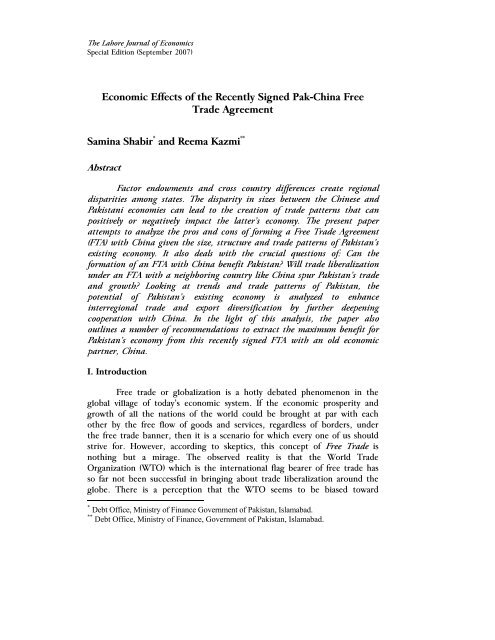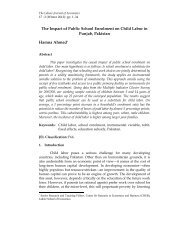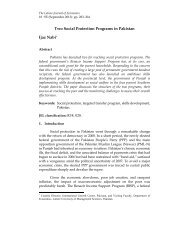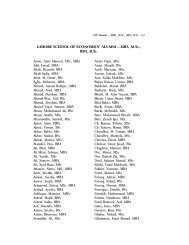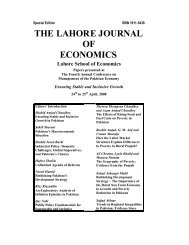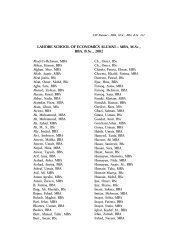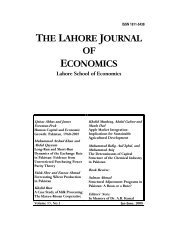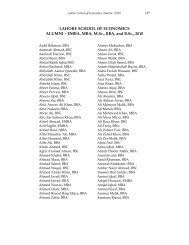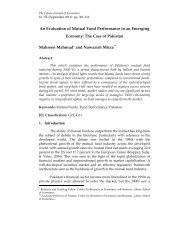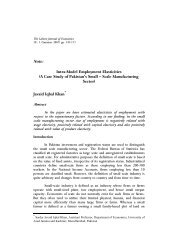Special Edition-07.pdf - Lahore School of Economics
Special Edition-07.pdf - Lahore School of Economics
Special Edition-07.pdf - Lahore School of Economics
Create successful ePaper yourself
Turn your PDF publications into a flip-book with our unique Google optimized e-Paper software.
The <strong>Lahore</strong> Journal <strong>of</strong> <strong>Economics</strong><br />
<strong>Special</strong> <strong>Edition</strong> (September 2007)<br />
Economic Effects <strong>of</strong> the Recently Signed Pak-China Free<br />
Trade Agreement<br />
Samina Shabir * and Reema Kazmi **<br />
Abstract<br />
Factor endowments and cross country differences create regional<br />
disparities among states. The disparity in sizes between the Chinese and<br />
Pakistani economies can lead to the creation <strong>of</strong> trade patterns that can<br />
positively or negatively impact the latter’s economy. The present paper<br />
attempts to analyze the pros and cons <strong>of</strong> forming a Free Trade Agreement<br />
(FTA) with China given the size, structure and trade patterns <strong>of</strong> Pakistan’s<br />
existing economy. It also deals with the crucial questions <strong>of</strong>: Can the<br />
formation <strong>of</strong> an FTA with China benefit Pakistan? Will trade liberalization<br />
under an FTA with a neighboring country like China spur Pakistan’s trade<br />
and growth? Looking at trends and trade patterns <strong>of</strong> Pakistan, the<br />
potential <strong>of</strong> Pakistan’s existing economy is analyzed to enhance<br />
interregional trade and export diversification by further deepening<br />
cooperation with China. In the light <strong>of</strong> this analysis, the paper also<br />
outlines a number <strong>of</strong> recommendations to extract the maximum benefit for<br />
Pakistan’s economy from this recently signed FTA with an old economic<br />
partner, China.<br />
I. Introduction<br />
Free trade or globalization is a hotly debated phenomenon in the<br />
global village <strong>of</strong> today’s economic system. If the economic prosperity and<br />
growth <strong>of</strong> all the nations <strong>of</strong> the world could be brought at par with each<br />
other by the free flow <strong>of</strong> goods and services, regardless <strong>of</strong> borders, under<br />
the free trade banner, then it is a scenario for which every one <strong>of</strong> us should<br />
strive for. However, according to skeptics, this concept <strong>of</strong> Free Trade is<br />
nothing but a mirage. The observed reality is that the World Trade<br />
Organization (WTO) which is the international flag bearer <strong>of</strong> free trade has<br />
so far not been successful in bringing about trade liberalization around the<br />
globe. There is a perception that the WTO seems to be biased toward<br />
* Debt Office, Ministry <strong>of</strong> Finance Government <strong>of</strong> Pakistan, Islamabad.<br />
** Debt Office, Ministry <strong>of</strong> Finance, Government <strong>of</strong> Pakistan, Islamabad.


